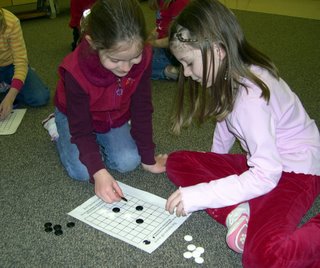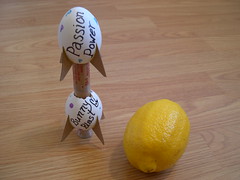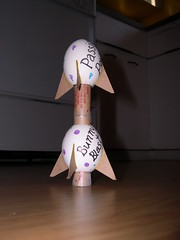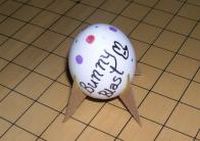
There are many things that I enjoy about the game of Go. One would be the great people that I have met - both online and in person - through the game. Another would be the satisfaction that I feel whenever I receive demonstrable proof that my knowledge of this fascinating game is improving. And a third would be sharing my love of the game with others that are open to learning it. It is this final point that motivated me to try starting up a go club at my children’s elementary school - Garneau School in Edmonton.
I am the father of six-year old twin girls. Much to my joy, they have been interested in playing the occasional game of 9-by-9 capture Go with me since they were four. In September 2005 they entered grade one. I soon noticed that the school had a number of lunch hour clubs for the older children, but nothing for the grades one and twos. Naturally, I thought, there should be a Go club to fill this void!
I found that the school principal, Crystal Mills, who runs the school chess club, was very supportive of the idea. In a matter of days, I had the music room booked every Thursday lunch hour and an announcement was made to parents in the school newsletter. The idea of a lunch hour club was such a novelty for the grades one and twos that on the first day, I found myself immersed in a sea of roughly 40 six and seven-year-olds all eager to learn about this intriguing game with stones that look like black and white candy. Over time, the participation level thinned out to a manageable 10 children per week. The kids are having a great time learning and playing and I am too! It is amazing to see them power through first-capture games on photocopied CGA 9-by-9 boards at lightening speed, and I can see that they are all improving week after week. I have just started trying out “territory Go” with them since the New Year. I cannot wait for the day that one of the children beats me with a two stone handicap - I will be so proud!
Tips for starting a school Go club
- Use the great American Go Association "Teaching Go" page. It is full of wonderful resources. I used some of Susan Weir’s material to help explain the educational value of the Go club to parents.
- Be prepared. Have a lesson plan for every club meeting. Younger children especially want to play, but some group teaching is necessary for them to improve. Decide whether you want to teach first-capture Go to start, as I did, or jump right into "real" Go.
- Secure real glass Go stones - children love the tactile experience of handling the stones. Either borrow them from your local club or see if the school will invest in a couple of sets - they are readily available from online Go vendors. Just do not spend too much as the stone will get damaged over time no matter how careful you are. Do not worry too much about boards - at least initially - as photocopied 9-by-9 boards are all that you need to start.
- For older children, consider using Hikaru-no-Go manga and anime as a teaching tool. I have not tried this with my group, but I am certain that it would work with older children.
- AGA Teaching Go page
- CGA resources page
- The Edmonton Sabaki Go Club sells Go books and stones
- About Hikaru-no-Go
- The Go Aggregator, your one stop for free English Go news, games, and talk (shameless plug)
I would like to say special thanks to the Edmonton Sabaki Go Club (your humble hosts for the 2006 Canadian Open in Edmonton on Labour Day weekend) who graciously loaned three sets of stones to support the Garneau School Go Club. Amazingly, the children have only broken a dozen of the glass stones so far - sorry, guys.



